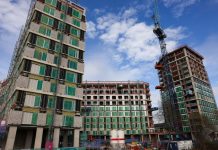Some business owners in Bristol are facing a sizeable increase in their rates while others benefit from a substantial drop, according to Colliers International, the global commercial real estate agency and consultancy.
Analysis by the Rating team in the Bristol office of the global real estate company of newly published draft rateable values from the Valuation Office Agency (VOA) has shown that retailers on Gloucester Road are set for rises of up to 50 per cent, while increases of up to 15 per cent are in the offing for Whiteladies Road.
By contrast, rateable values are likely to drop by between 10 and 15 per cent for shops in Broadmead, and in nearby Cabot Circus some stores are to enjoy a rates decrease of up to 20 per cent while others near them could see their rates remain unchanged.
Senior surveyor Dan Johnstone said: “The degree of variation between these new draft rates for retailers within the same city is indicative of the chaos that has characterised the Government’s revaluation of business rates.
“Large increases in certain areas of Bristol will hit the already beleaguered retailers. While there will be a period of transitional relief that will limit increases, the fact is that within around three years an independent retailer on Gloucester Road who has had a business rates rise of about 50 per cent will be paying the full amount of their increase.”
He added that the recent publication of rateable values and proposed transitional relief closely follow a Government proposal which will all but remove the ability of business owners to appeal their business rates’ bill.
Colliers International is lobbying government for a more generous upwards transition scheme and the abolition of the downward transition scheme in order to soften the blow of the new rateable values, which were published on Friday September 30th.
John Webber, Head of Rating, at Colliers International, said: “This clear infringement of a rate payer’s right to appeal their rateable value must not be allowed to form part of the government’s business rates’ appeals’ whitewash. We shouldn’t forget that 300,000 businesses are still awaiting decisions about appeals lodged up to seven years’ ago. These proposed regulations are extremely draconian.”
He added that the Government’s decision to delay the proposed 2015 revaluation had led to the present business rates chaos, which has also seen some of the best shopping streets in London facing unprecedented rates’ rises. Bond Street will climb over 100 per cent with Westfield White City braced for 62 per cent rises, and 50 per cent rateable value increases for some floors in The Shard. London Regent’s Street can expect close to 40 per cent increases for the prime retail locations, while Euston Tower can expect between 30 and 40 per cent increases in rateable value.
He said: “This mess is of the government’s making when they decided to postpone the revaluation: they need to put their hand in their pocket and do the right thing for vast swathes of the country.”
“The reality is that when you scratch beneath the surface of the government’s well-oiled and well-timed PR machine, what is revealed are small reductions for the majority and massive increases for London which is a rates disaster. These are the largest changes for a generation: bad for business and bad for growth in this post-Brexit world.”
Colliers Manifesto for Business Rates Reform:
– More frequent revaluations, three-yearly, at least, by 2022;
– Increase funding for VOA in order to deal with existing appeals’ backlog;
– Release VOA from pressure exerted by local councils and HM Treasury;
– Introduce a register of appeals professionals – removing the ‘cowboy’ element;
– Iron out inequalities where small business pays a higher proportion in business rates;
– Root and branch reform of current business rates exemptions and reliefs.























